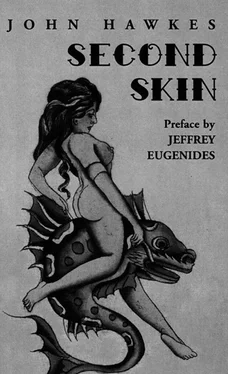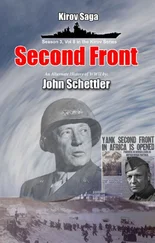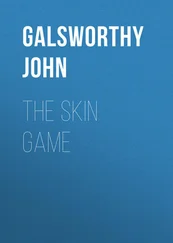“I think I told you. Sonny, that I’m taking Cassandra and Pixie to a gentle island. You won’t need to worry about them.”
“That’s it, that’s it. Skipper. These two little ladies are in good hands. Well now. Well, I understand. And I got a gentle island too if I can just find her. Wanders around some, true enough, but she sure is gentle and she sure just about accommodates an old black castaway like me. Oh, just let Sonny crawl up on that gentle shore!” He was nodding, smiling, with his long smoky five-gaited fingers was trying to turn Pixie on his lap, fondling, probing the fingers, gently feeling for the source of her tiny noise, and all the while kept the two great cold black lenses of his pink and white shell-rimmed sunglasses fixed in my direction. Nodding, at last beginning to croon through his nose — tight lips, menacing cheekbones — holding Pixie and shining all his black love into my heart.
But Pixie was crying. She was crying her loudest with tiny pug nose wrinkled, wet, tiny eyes bright and angry, tiny hands in fists, tiny arms swinging in spasms and doll’s dress bunched around her middle, and her cry was only the faint turbulence of an insect trapped in a bottle. Amusing. Pitiful. A little bottle of grief like her mother.
“Pixie don’t like this separation stuff,” crooning, chucking her under the chin with the tip of his long black finger while Cassandra and I leaned forward to see, to hear: “Pixie don’t approve of our family busting up this way.” And she bent her rubbery knees, kicked, striking on the table the little dirty white calfskin shoe that was untied, unkempt, forlorn, and then she was suddenly quiet, appeased, and smiled at Sonny and caught his finger as if to bite it to the bone with all the delight and savagery of the tiny child spoiled and underfed — rancid baby bottles, thin chocolate bars — through all her dreary abandoned days in wartime transit.
“That’s the sign, folks! Pixie’s ready! Time to go!”
I sat still, I flung my face into the smell of the empty glass, Cassandra took up her purse. And then we were in single file and pushing through the crowd of sailors. First Sonny — flight bag, paper bag stuffed with chicken salad sandwiches. Pixie riding high on his shoulders and thumping his cap — and then Cassandra — small, proud, prisoner of lost love, mother of child, barelegged and desirable, in her own way widowed and silvery and slender, walking now through anchors and booze and the anonymous cross-country passion of the Infantry March — and then in the rear myself — more tired than ever, bald, confused, two hundred pounds of old junior-grade naval officer and close to tears. This our dismal procession with Sonny leading the way. “Step aside there, fella, you don’t want to tangle with the Chief!” Pixie was blowing kisses to the sailors; Cassandra was wearing her invisible chains, invisible flowers; and I refused to see, to acknowledge the scampering white-slavers, refused to say goodby to all those little Chinese waiters. Then out the door.
Long steel body like a submarine. Giant black recapped tires. Driver — another mean nigger, as Sonny would say — already stiff and silhouetted behind his sheet of glass and wearing his dark slant-eyed driving glasses and his little Air Force style cap crushed and peaked, ready and waiting to take her up, to start the mission. Concrete pillars, iron doors, dollies heaped high with duffel bags, no lights, crowds of sailors, odor of low-lying diesel smoke, little dry blisters of chewing gum under our feet, and noise. Noise of sailors banging on the sides of the bus and singing and vomiting and crying out to their dead buddies. The terminal. Our point of departure. And the tickets were flying and the SP’s were ferocious ghosts, leaping in pairs on victim, lunging slyly, swinging hard with the little wet oaken clubs.
So at last we were packed together in rude and shameless embrace and at last we were shouting: “You go on now. Skipper,” tall dancer, black cannon mouth, blow in the ribs, weighing me down with child, provisions, canvas bag, “you go on and get you a nice seat. Take your ladies on off to your island — I’m going to be on mine — no unfaithful lovers on my island. Skipper, just me, now you keeps your island the same. Good-by now, and you remember, Skipper, I’m going to lie me down on my island and just look at them pictures and think of you and Pixie and Miss Cassandra. So long!”
“Sonny!” Crying aloud, crying, bumping against him, bumping and trying to shift the wretched child out of our way, then falling against his tall black twisting form — glint of the buttons, bones of a lean steer, glimpse of a fading smile — then throwing myself and managing at last to kiss the two dark cheeks, warm, oddly soft and dry, affectionate long panther paws, kissing and calling out to him: “Good-by, Sonny. Bon voyage!” Then we were flowing on a rough stream toward the bus and he was gone. Poor Sonny.
But Sonny was not gone at all. Not yet. The three of us were carried backwards and up into the great dark steel cylinder of our reckless ten-wheeled transport. We joined that monstrous riot for seats — one hundred and three men, a woman, a child, swallowed up for numerous sins and petty crimes into this terrible nonstop belly of ours and fighting hopelessly for breath, for privacy — and were lucky enough to snatch two seats together and to crouch down with flight bag and sandwiches between our legs and my hat askew and the skirt of Cassandra’s frock crumpled above her knees. They were slim knees, bare, slender, glistening, disregarded. It was dark, the aisle was heaped high with white duffel bags. And did each of those sagging white canvas shapes represent the dead body of a bantamweight buddy saved from the sea and stowed away in canvas, at last to be lugged or flung aboard Interstate Carrier Number twenty-seven, bound nonstop for the great navy yard of the east? I looked for only a moment at Cassandra’s knees and then quickly lifted my granddaughter to the pitch-dark window at my side. Pixie was crying again — insect going berserk in his glass, little fists socking the window — and the sailors were flashing their Zippo lighters and slowly, slowly, we were beginning to move. And then three figures struggled out of the flat gray planes and cumbersome shadows of the concrete, and dashed toward the front of the bus. The tall drunk bosun’s mate was waving, Sonny was waving, and between them the moaning sailor was rolling his head, dragging his feet. The tubular door sprang halfway open and, “That’s it,” helpful, officious, out of breath, “get these fellas inside there … that’s it! ” And then Sonny was alone in the dark and we were backing slowly from the terminal in a wake of oil and compressed air. I pressed my face to the window, against the glass, too tired to make a farewell sign with my hand.
Off to one side, puffing, straightening his coat, Sonny continued to follow us. I saw his imperious arm, saw his slow imperious stride and the long fingers pointing instructions to the driver. Sonny held up his flat hand and we stopped; Sonny began to swing his arm and we started forward, turned, paced his tall backward-stepping shadow — anxious glance over his shoulder, summoning gesture of the long thin arm and flashing cuff — and then he stood aside and waved us on. I smiled, lost him, but even in the blast of the diesel heard what he must have communicated to his mean black brother in the cockpit: “You’re OK. Now just keep this thing on the road. …”
Then I leaned back heavily and, pain or no pain, shifted Pixie so that she stretched herself flat on my chest and slept immediately. I lay there watching the stars and feeling my hunger grow. The paper bag was between Cassandra’s feet, not mine, yet I could see the crushed bulk of it, the waxed paper and wilted lettuce, the stubby wet slices of white meat Sonny had prepared for us on a wobbling card table squeezed into the dirty porcelain lavatory of our cheap hotel. I could taste the white bread — no crusts — I could taste the black market mayonnaise. How many miles behind us now? Five? Ten? The bus was accelerating, was slowly filling with the smell of whisky — thick nectar of lonely travelers — and filled with the sounds of the ukelele, the tuneless instrument of the American fleet, and in her sleep Pixie was sucking her fingers and overhead the stars were awash in the empty black fields of the night. I thought of empty dry docks, empty doorways, empty hotels, empty military camps, thought of him fixing the sandwiches while we slept — pepper, salt, tin spoon and knife— saw him drinking a can of beer on the fantail of the Starfish on a humid and windless night. I saw him prostrate on his island of brown flesh, heard the first sounds of returning love.
Читать дальше












